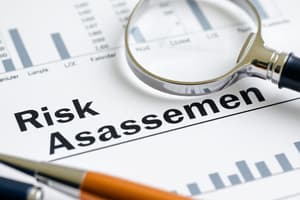Podcast
Questions and Answers
What is the primary concern of auditing risks?
What is the primary concern of auditing risks?
- The possibility of expressing an incorrect opinion on an entity's financial statements (correct)
- The entity's financial performance
- The complexity of the auditor's procedures
- The auditor's professional reputation
Which type of auditing risk refers to the risk that the auditor will not detect a material misstatement?
Which type of auditing risk refers to the risk that the auditor will not detect a material misstatement?
- Control Risk
- Detection Risk (correct)
- Non-Detection Risk
- Inherent Risk
What is an example of a factor that may increase the risk of material misstatement?
What is an example of a factor that may increase the risk of material misstatement?
- Economic upturns
- The auditor's expertise in the industry
- Strong internal controls
- Complexity of transactions (correct)
What is the primary objective of risk assessment in auditing?
What is the primary objective of risk assessment in auditing?
What may be the consequence of an auditor failing to detect material misstatements?
What may be the consequence of an auditor failing to detect material misstatements?
What is the purpose of designing and performing audit procedures?
What is the purpose of designing and performing audit procedures?
What is the risk that a material misstatement will not be prevented or detected by the entity's internal controls?
What is the risk that a material misstatement will not be prevented or detected by the entity's internal controls?
What is the risk of material misstatement in the absence of internal controls?
What is the risk of material misstatement in the absence of internal controls?
Flashcards are hidden until you start studying
Study Notes
Auditing Risks
Definition
Auditing risks refer to the possibility that an auditor may express an incorrect opinion on an entity's financial statements.
Types of Auditing Risks
- Detection Risk: The risk that the auditor will not detect a material misstatement.
- Non-Detection Risk: The risk that the auditor will not detect a material misstatement and will therefore issue an unmodified opinion on financial statements that contain material misstatements.
- Control Risk: The risk that a material misstatement will not be prevented or detected by the entity's internal controls.
- Inherent Risk: The risk of material misstatement in the absence of internal controls.
Factors Affecting Auditing Risks
- Complexity of Transactions: Complex transactions may increase the risk of material misstatement.
- Industry and Economic Conditions: Economic downturns or recessions may increase the risk of material misstatement.
- Entity's Internal Controls: Weak internal controls may increase the risk of material misstatement.
- Auditor's Expertise and Experience: Lack of expertise or experience in a particular industry or area may increase the risk of material misstatement.
Managing Auditing Risks
- Risk Assessment: Identify and assess the risks of material misstatement.
- Audit Procedures: Design and perform audit procedures to respond to identified risks.
- Evaluation of Evidence: Evaluate the evidence obtained from audit procedures to support the auditor's opinion.
Consequences of Auditing Risks
- Qualified or Adverse Opinion: The auditor may express a qualified or adverse opinion on the entity's financial statements.
- Lawsuits and Litigation: The auditor may be sued by the entity or its stakeholders for failing to detect material misstatements.
- Reputation Damage: The auditor's reputation may be damaged if they fail to detect material misstatements.
Auditing Risks
Definition
- Auditing risks refer to the possibility of an auditor expressing an incorrect opinion on an entity's financial statements.
Types of Auditing Risks
- Detection Risk: the risk that the auditor will not detect a material misstatement.
- Non-Detection Risk: the risk that the auditor will not detect a material misstatement and issue an unmodified opinion on financial statements with material misstatements.
- Control Risk: the risk that a material misstatement will not be prevented or detected by the entity's internal controls.
- Inherent Risk: the risk of material misstatement in the absence of internal controls.
Factors Affecting Auditing Risks
- Complexity of Transactions: complex transactions increase the risk of material misstatement.
- Industry and Economic Conditions: economic downturns or recessions increase the risk of material misstatement.
- Entity's Internal Controls: weak internal controls increase the risk of material misstatement.
- Auditor's Expertise and Experience: lack of expertise or experience in a particular industry or area increases the risk of material misstatement.
Managing Auditing Risks
- Risk Assessment: identify and assess the risks of material misstatement.
- Audit Procedures: design and perform audit procedures to respond to identified risks.
- Evaluation of Evidence: evaluate the evidence obtained from audit procedures to support the auditor's opinion.
Consequences of Auditing Risks
- Qualified or Adverse Opinion: the auditor may express a qualified or adverse opinion on the entity's financial statements.
- Lawsuits and Litigation: the auditor may be sued by the entity or its stakeholders for failing to detect material misstatements.
- Reputation Damage: the auditor's reputation may be damaged if they fail to detect material misstatements.
Studying That Suits You
Use AI to generate personalized quizzes and flashcards to suit your learning preferences.




